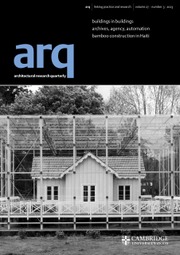Article contents
Constructing platform capitalism: inspecting the political techno-economy of Building Information Modelling
Published online by Cambridge University Press: 05 January 2023
Extract
In this article, we argue that in order to properly assess the potentials, challenges, and implications of the digital transformation in architecture and construction, we need to better understand the political-economic dynamics behind it and examine it in light of the current reorganisation of global capitalism. The focus of this article is therefore on the larger political-economic and techno-economic conditions that are shaping the implementation of digital technologies in the architecture, engineering, and construction (AEC) sector. Based on document analysis on the digital turn in architecture and construction, along with interviews with AEC professionals, we argue that the logic of platform capitalism is beginning to transform the industry, with Building Information Modelling (BIM) acting as an obligatory passage point and government policies as gate-openers. The article, first, discusses concepts of platform and platform capitalism and indicates how these apply to recent reconfigurations of actor and power relations in the field. Second, it reviews some of the developments in digital architecture from 2D drawings to BIM and beyond. Third, it examines the role of government policies as driving forces in the digital transformation. Forth, it takes a closer look at the case of software producer Autodesk and their BIM product Revit, which illustrates how the logic of platform capitalism has gained traction in architecture and construction. Finally, it concludes that some expectations can be derived from these observations: In the realm of design software, we can expect a further concentration of economic power and a near-monopolistic structure of the market. Moreover, we can expect a shift of focus and investment from architectural design to socio-digital modes of construction and urban planning that benefit primarily real estate owners, investors, developers, and construction companies. Furthermore, we can expect large construction firms to secure themselves a comfortable starting position as early adopters, while SMEs are facing bigger challenges to benefit from the digital transformation. Lastly, we can expect a further encroachment of tech giants and domain outsiders such as Alphabet into architecture and construction, turning buildings and cities into machines for data extraction.
- Type
- Full Paper
- Information
- Creative Commons
- This is an Open Access article, distributed under the terms of the Creative Commons Attribution licence (http://creativecommons.org/licenses/by/4.0/), which permits unrestricted re-use, distribution and reproduction, provided the original article is properly cited.
- Copyright
- © The Author(s), 2022. Published by Cambridge University Press
- 1
- Cited by




